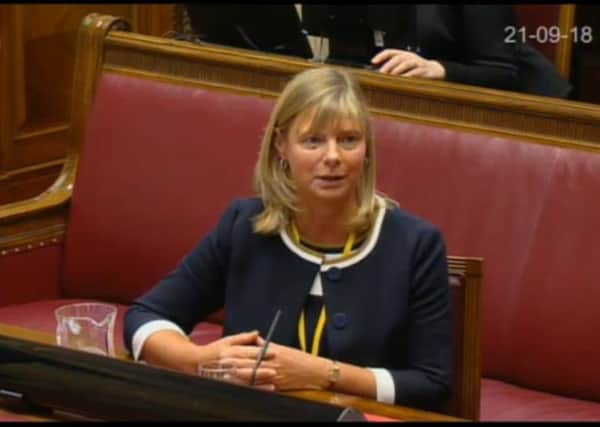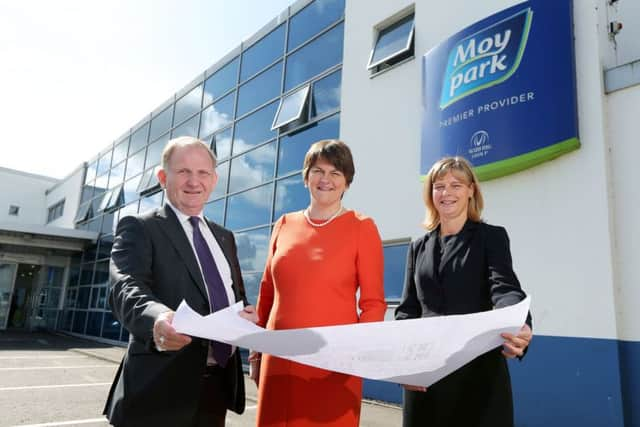RHI Inquiry: Ex-boss of poultry giant Moy Park admits it financially benefited from RHI


Janet McCollum, who was replaced as chief executive of Moy Park earlier this year, told the RHI Inquiry that although she now accepts that her former company received an “indirect benefit” from the publicly-funded scheme, that has become clear from the public inquiry’s work.
However, Mrs McCollum, who is a trained accountant and was Moy Park’s chief finance officer before being promoted to head the company, said she was ignorant of that fact at the time when the company was reaping that financial reward.
Advertisement
Hide AdAdvertisement
Hide AdThe company, which supplies 30% of all UK chicken, had four boilers of its own, but its farmers – to whom Moy Park advertised the scheme – have between them 40% of the boilers on the scheme.


Earlier evidence to the inquiry from one of those farmers showed how Moy Park’s complex business model meant that the benefits which appeared to be going to farmers ultimately began to accrue to the company itself – with taxpayers’ money indirectly ending up in the bank account of its Brazilian parent company.
In her written evidence, Mrs McCollum said: “Moy Park has not indirectly earned any RHI scheme tariff income”.
Moy Park is well connected at the top of Stormont, with the inquiry having already revealed that Arlene Foster’s former adviser, Andrew Crawford, tipped the firm off that RHI was to close – leading to it immediately ramping up its attempts to get as many boilers on the scheme as possible.
Advertisement
Hide AdAdvertisement
Hide AdHowever, under close questioning at the inquiry yesterday Mrs McCollum accepted that the lucrative RHI payments to its farmers not only helped it to rapidly expand its business by funding better heating systems for poultry houses but also helped make up for a shortfall between the fuel allowance which Moy Park was prepared to pay to its farmers and the cost of the fuel which they required to raise chickens.
In June, she told the inquiry that she was never made aware that RHI was financially benefiting the company in an indirect way.
When asked if she ought to have been told of that, Mrs McCollum was initially vague in her answer, saying that after reviewing information last year she could see that there was “potentially” an indirect benefit to the company.
Eventually, she went on to say: “So, looking at the indirect benefit and the evidence that’s been brought to the inquiry that I’ve seen, I can understand how it might be considered that Moy Park might have benefited indirectly from the RHI scheme from the commercial arrangements that have been long-standing in place with the growers.”
Advertisement
Hide AdAdvertisement
Hide AdShe went on to say “I can understand how it might be considered that Moy Park might have had an indirect benefit.”
She said that no-one in the company ever brought it to her attention that the company was benefiting from RHI.
When asked if she was surprised that no one had told her that, she said she believed her staff were trying to ensure that they did meet all the farmers’ fuel costs – even though not doing so was financially advantageous to the company.
When asked the question again, she paused before insisting: “The company did not see at that point in time an indirect benefit.”
Advertisement
Hide AdAdvertisement
Hide AdSir Patrick Coghlin then intervened to say: “So you were not surprised?” She said: “No, because the emphasis was on the over-usage, chairman.”
Then, having initially conceded that RHI “might be considered” an indirect benefit to the company, after being pressed she paused before saying: “Yes, it’s an indirect benefit...”
Sir Patrick then pressed her on when she first became aware that benefit. She said: “I first became aware of that through, having left the business, through the inquiry’s evidence that had been brought and the questions that have been asked.”
Janet McCollum repeatedly told the inquiry that Moy Park’s decision to pay its farmers less for heat than she now accepts they needed was out of a desire to discourage wasteful heat, rather than an attempt to increase the company’s profits.
Advertisement
Hide AdAdvertisement
Hide AdThe former Moy Park chief executive was repeatedly pressed on how she could have been unaware of how the company she headed was profiting from the scheme.
Inquiry counsel Donal Lunny put it to the witness: “So you were never aware of that indirect benefit – which you now accept existed – during your time as chief executive.
“To go back, again, to a question I asked earlier, does that now surprise you – that nobody within your organisation had brought that to your attention?”
Mrs McCollum replied: “The company and the team, I believe, were trying to do the right thing in a situation where there was a lot of heightened awareness around usage. The focus was on ensuring responsible usage of heat.”
Advertisement
Hide AdAdvertisement
Hide AdPressed again to answer the question of whether it surprised her she wasn’t told about it, she said: “Well, it would surprise me if the team had seen it as an indirect benefit.
“It wasn’t recognised as an indirect benefit – but I can see how it is an indirect benefit. It wasn’t talked about as an indirect benefit.”
Mr Lunny took the former Moy Park boss to documentary evidence which the inquiry has compelled the company to release which shows that it was aware that it was reasonable for farmers to use about double the amount of heat that it was prepared to pay for.
He put it to her that the RHI benefit to the company must have been “obvious” to it as it calculated how much to pay its farmers for heat.
Advertisement
Hide AdAdvertisement
Hide AdMrs McCollum did not directly answer the question, which Mr Lunny then asked a second time.
“She again did not directly answer the question, prompting the barrister to ask it a third time.
Mrs McCollum eventually said that it had not been obvious to her that RHI was benefiting the company of which she was chief executive until after she had left her role.
Under questioning from the inquiry’s technical assessor, Janet McCollum agreed that as a business Moy Park would have kept a tight rein on costs and would not have knowingly paid its farmers more than they needed for their expenses.
Advertisement
Hide AdAdvertisement
Hide AdEnergy expert Keith MacLean put it to her that it was clear that the company was keeping very detailed information so that it set its allowances for farmers at a rate which did not disadvantage it by being overly generous.
He said that if Moy Park was not able to do those calculations “it sounds quite surprising for an organisation of your size and importance that you’re incapable of doing what the industry from both sides – the consumers and suppliers [of RHI boilers] – seem to have been able to do from a few weeks after the scheme came into force. Are you really describing a deficiency in the ability of your organisation to do those sums?”
Mrs McCollum said: “I believe the organisation took the evidence that was available to them at that point in time...on the implementation of the fuel allowance for biomass, we immediately increased it by 50% OK? That’s why I’m saying there was a really significant increase in the energy allowance. Subsequent to that, the year later, looking at the GB evidence, we brought it up. I believe the differential in fuel allowance is relatively small.”
Dr MacLean said he found it “very hard to understand” how a huge firm like Moy Park would not be able to do the same sums which RHI claimants were doing and thus concluding “there is a benefit here accruing to us because we are paying less than it is costing the farmers – but we’re quite comfortable, morally, to be doing that because we know that they’re making a killing on the subsidy”.
Advertisement
Hide AdAdvertisement
Hide AdMrs McCollum said: “I understand the perspective you’re taking there and I think it’s all down to the usage element and how the usage relates to what the growers were using and what that gap potentially is.”
*** Next week is set to be the highest profile week of the inquiry thus far, with the entire week taken up with senior DUP figures.
On Tuesday, leader Arlene Foster will return to testify, particularly in relation to the period in which cost controls were delayed and her then-adviser is alleged to have been working to delay them – something he denies.
On Wednesday, John Robinson – whose father-in-law is an RHI claimant and who was once the Spad in the department running the scheme but is now the DUP’s chief spin doctor – will testify.
Advertisement
Hide AdAdvertisement
Hide AdHe will be followed by another ex-DUP Spad, Stephen Brimstone, who is an RHI claimant. And on Friday the inquiry will hear from the DUP’s most senior backroom figure – its chief executive, Timothy Johnston.